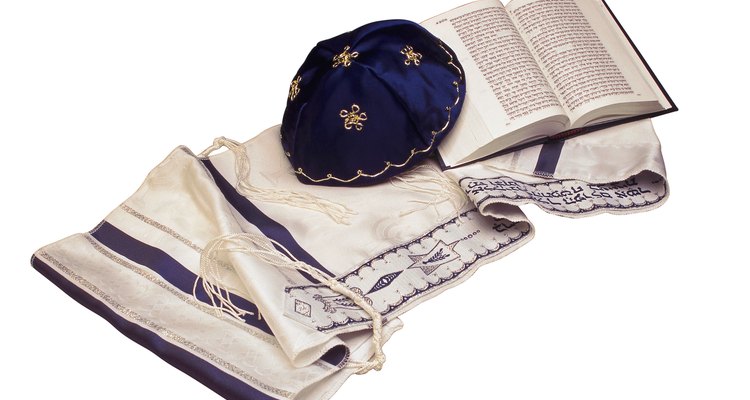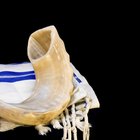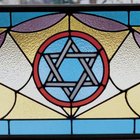
Comstock/Comstock/Getty Images
To express their brokenheartedness after the death of a loved one, Jewish mourners traditionally tear their clothing or pin on a torn ribbon, a ritual act called keriah. The bereaved usually wear their ribbons or torn clothes for the first seven days after the funeral, which are an intense period of mourning called shivah; some people choose to wear their ribbons for a full 30 days after the funeral.
The Tradition of Keriah
The custom of rending one's garments following the death of a close family member is rooted in the biblical stories of Jacob, David and Job, each of whom tore his clothes when he received tragic news. Today, traditional Jews tear their clothes by hand, making the tear over their hearts or in another visible place. Reform Jews often tear a black ribbon instead and pin it to their clothes, usually over their hearts for the death of a parent or on the right side of their chests for other losses.
Who Performs Keriah?
Jewish tradition considers only the close family members of the deceased to be official mourners. Because of this, only the deceased's parents, children, siblings and spouse should tear their clothes or wear a ribbon. Children younger than the age of 13 and the mentally ill aren't required to perform keriah, although children should have another family member wear an extra ribbon for them. Children may also tear their clothing very slightly or wear a ribbon with a very small tear in it to recognize their family's loss.
Ritual Tearing
Whether a mourner chooses to tear his clothes or wear a ribbon, he should make the tear himself, if possible, usually either just before the ceremony or just before the casket is buried. Some people tear their clothes as soon as they hear about their loss, but this is less common. Before tearing or while doing so, the mourner or the rabbi recites the blessing "Baruch atah Adonai Eloheinu melech haolam, dayan ha'emet," which means "Blessed are You, Lord our God, king of the universe, the true judge."
Removing the Ribbon
The rules regarding when to remove the ribbon or wear undamaged clothes depend on the mourner's relationship with the deceased. If the mourner has lost a parent, he should wear the ribbon for all seven days of the shivah period and may choose to wear it for 30 days. If the mourner has lost a different relative, the tradition encourages him to wear the ribbon for all seven days of shivah but doesn't require it; he may choose not to re-pin it onto a clean set of clothes when he changes. All mourners should remove the ribbon or wear untorn clothes during the Sabbath and other major holidays that fall during the shivah period.
Related Articles

Dress Etiquette for Jewish Funerals

What Is the Meaning of the Tassels of ...

How to Deal With Your Stepmother When ...

Jewish Funeral Etiquette for Gentiles

How to Make Large Decorative Bows

Ribbon Meanings for a Handfasting ...

How to Get Rid of Perspiration Stains ...

How to Date a Widower With Children

How to Fix a Ripped Shirt

Sympathy Gifts for a Mother Losing Her ...

Do Women Still Wear Veils to Funerals?

The Common Procedures of a Catholic ...

How to Let Your Boyfriend Grieve the ...

How to Cook a Choice New York Roast

How to Fold a Jewish Prayer Shawl

How to Remove Burdocks From Clothes

How to Date a Newly Widowed Man

How to Tie a Baptism Bonnet

How to Grieve With Someone Who Lost an ...

Prayer Shawls at Jewish Weddings
Writer Bio
Stephanie Mitchell is a professional writer who has authored websites and articles for real estate agents, self-help coaches and casting directors. Mitchell also regularly edits websites, business correspondence, resumes and full-length manuscripts. She graduated from Syracuse University in 2007 with a Bachelor of Fine Arts in musical theater.
Photo Credits
Comstock/Comstock/Getty Images